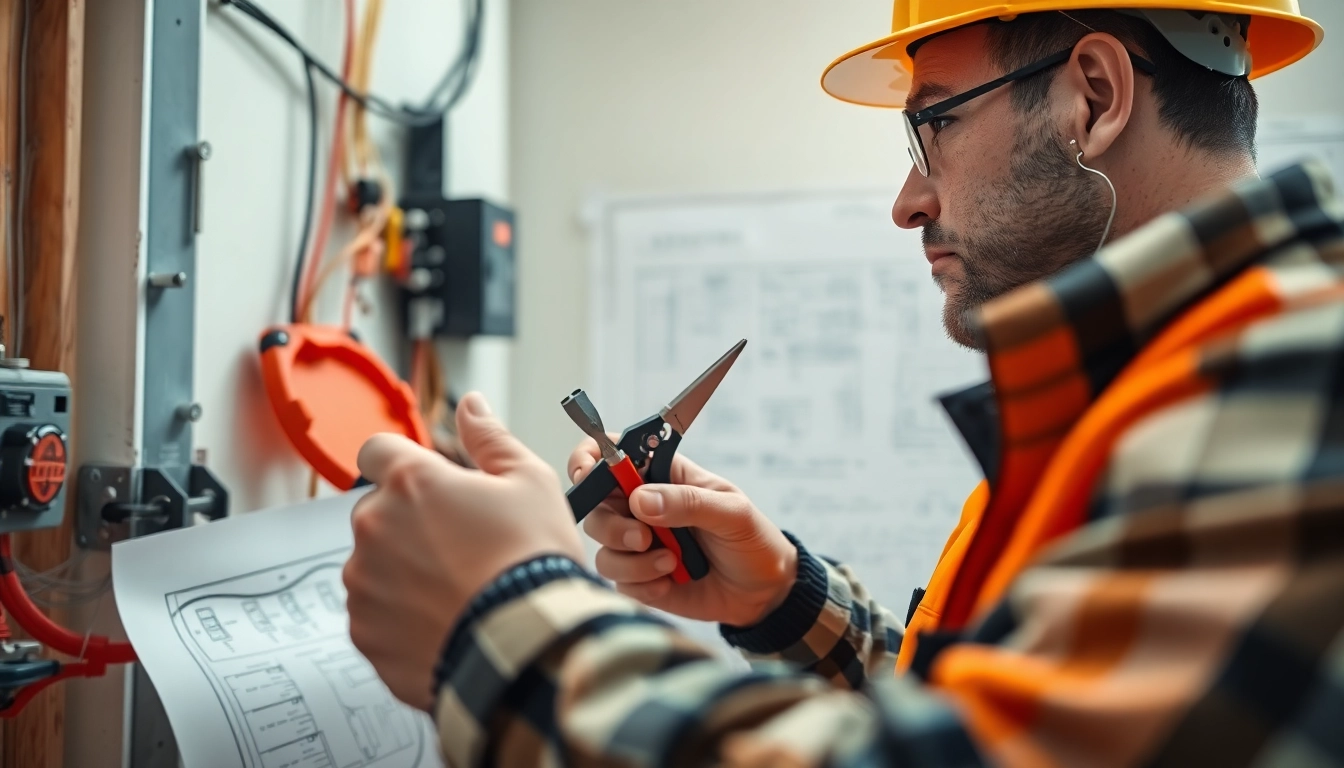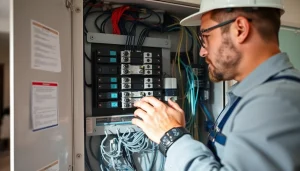Comprehensive Guide to Electrical Contractor Services and Responsibilities
Understanding the Role of an Electrical Contractor
What is an Electrical Contractor?
An electrical contractor is a professional individual or firm that performs specialized construction work related to the design, installation, and maintenance of electrical systems in various structures. These systems can be found in residential buildings, commercial spaces, industrial facilities, and more. As experts in their field, electrical contractors are responsible for ensuring that all electrical work complies with the national and local codes and regulations.
Electrical contractors can work as independent operators or as employees of larger contracting firms. They may engage in projects ranging from new constructions and renovations to routine maintenance and emergency repairs. Their role is crucial as they not only ensure functionality but also the safety of electrical installations.
Key Responsibilities of an Electrical Contractor
The responsibilities of an electrical contractor are diverse and can vary depending on the type of project. Key responsibilities include:
- Designing Electrical Systems: Contractors work with engineers and clients to design systems that meet specific needs while adhering to safety and regulatory standards.
- Installing Electrical Systems: This includes wiring, lighting, panel boxes, outlets, and other electrical components.
- Maintaining Systems: Ongoing maintenance is critical to ensuring systems operate efficiently and safely. This may involve routine inspections and repairs.
- Ensuring Compliance: Contractors must stay updated on national electrical codes and local regulations, ensuring all work meets these standards.
- Managing Projects: This includes overseeing the budget, timeline, and workforce associated with each project.
Industries That Require Electrical Contractors
Electrical contractors serve a wide array of industries, each with unique demands:
- Residential Construction: Involves wiring homes, installing electrical fixtures, and ensuring power supply meets household needs.
- Commercial Buildings: Contractors work on offices, retail spaces, and more, installing complex lighting and power systems.
- Industrial Facilities: This often includes more extensive and specialized electrical work such as high-voltage systems.
- Telecommunications: Contractors are involved in the installation and maintenance of systems that support communication networks.
- Renewable Energy: Electrical contractors also play a significant role in installing and maintaining electrical equipment related to solar, wind, and other renewable energy sources.
Licensing and Certification for Electrical Contractors
Why Licensing is Essential for Electrical Contractors
Licensing is critical in the electrical contracting industry to ensure that contractors operate safely and competently. The license serves multiple purposes:
- Public Safety: Licensed contractors are required to adhere to safety standards to protect clients and the public.
- Quality Assurance: Licensing involves rigorous testing and education to ensure contractors possess the necessary skills and knowledge.
- Legal Compliance: Many jurisdictions require licensing by law, and operating without a valid license can result in penalties.
How to Obtain an Electrical Contractor License
The process for obtaining a license varies by state, but general steps include:
- Complete Required Education: Candidates typically must complete specific courses in electrical theory, code, and safety.
- Gain Practical Experience: This often involves working as an apprentice under a licensed contractor.
- Pass an Examination: Most states require passing a licensing exam that tests knowledge of electrical codes and practical skills.
- Submit Application: Applicants must fill out and submit a license application along with any required fees.
Continuing Education and Certifications
The electrical industry is continuously evolving, with new technologies and regulations emerging. Therefore, ongoing education is vital. Many states require continuing education credits to renew licensure. Additionally, contractors may pursue specialized certifications in specific areas such as:
- Green Technology: Certifications related to sustainable energy practices.
- Fire Alarm Systems: Training specific to fire alarm installation and maintenance.
- Low Voltage Systems: Focused on security, data, and telecommunications systems.
Essential Skills for a Successful Electrical Contractor
Technical Skills Required for Electrical Contractors
Technical proficiency is a given for any electrical contractor. Key technical skills include:
- Understanding Electrical Systems: Contractors must have a deep knowledge of electrical circuits, power distribution, and safety protocols.
- Problem-Solving: The ability to troubleshoot issues and implement effective solutions is crucial in the field.
- Blueprint Reading: Understanding blueprints and electrical diagrams is essential for successful installations.
- Use of Tools and Equipment: Familiarity with industry-standard tools and technologies is necessary for efficient work.
Soft Skills That Enhance Contractor Success
Alongside technical expertise, soft skills are equally important for electrical contractors. These include:
- Communication: Good communication skills enable contractors to work effectively with clients, suppliers, and team members.
- Time Management: Successful project completion requires excellent organizational and time management skills.
- Customer Service: Building strong client relationships is critical for repeat business and reputation.
- Leadership: For those managing teams, leadership skills help to motivate and direct their workforce effectively.
Importance of Safety Training for Electrical Contractors
Safety is paramount in electrical work. Proper safety training equips contractors with the knowledge to handle hazardous situations appropriately, reducing the risk of accidents and injuries. Engaging in ongoing safety education helps reinforce safety practices, keeping contractors and clients safe. Common topics covered include:
- Electrical Hazards: Understanding and mitigating potential dangers.
- Personal Protective Equipment (PPE): Proper usage of protective gear.
- Emergency Procedures: Knowing how to respond in case of electrical fires or accidents.
Choosing the Right Electrical Contractor for Your Project
Qualities to Look for in an Electrical Contractor
Selecting the right electrical contractor is essential for the success of any project. Key qualities to consider include:
- Experience: Look for contractors with a proven track record in similar projects.
- Reputation: Seek reviews and references from past clients to gauge satisfaction.
- Licensing: Ensure that the contractor holds the necessary licenses and certifications.
- Insurance: Verify that they carry sufficient liability and worker’s compensation insurance.
Questions to Ask Before Hiring an Electrical Contractor
Before making a final decision, it’s important to ask potential contractors the following questions:
- What is your experience with similar projects?
- Can you provide references from past clients?
- What is your approach to safety and compliance?
- How do you handle project timelines and budgets?
Understanding Electrical Contractor Quotes and Estimates
When receiving quotes and estimates, clarity is key. It’s important to understand what is included in the price. Typically, quotes should outline:
- Labor Costs: The cost associated with the workforce.
- Material Costs: A detailed list of materials needed for the project.
- Timeline: Estimated completion time and major milestones.
- Payment Terms: Clarity on when payments are due and any deposits required.
Trends and Innovations in the Electrical Contracting Industry
Emerging Technologies Affecting Electrical Contractors
With advancements in technology, the electrical contracting industry is seeing numerous innovations such as:
- Smart Home Systems: Integration of IoT technology for greater energy efficiency and automation.
- Green Energy Solutions: The rise of solar and wind power projects, requiring specialized knowledge.
- Advanced Tools: Use of drones and digital technologies for surveys and installations.
Sustainable Practices in Electrical Contracting
As sustainability becomes a growing concern, many electrical contractors are adopting greener practices, including:
- Energy-Efficient Installations: Incorporating LED lighting and energy monitoring systems.
- Recycling Materials: Striving to minimize waste by recycling old wiring and fixtures.
- Renewable Energy Projects: Installation of solar panels and other renewable systems.
The Future of Electrical Contracting Jobs
Considering the evolving landscape, the future of electrical contracting appears promising. There is a growing demand for skilled contractors in areas such as:
- Smart Grid Technology: As energy sectors modernize, the need for knowledgeable contractors increases.
- Electrification of Transportation: With the rise of electric vehicles, expertise in charging systems will be critical.
- Home Automation: The demand for smart technology integration continues to rise, necessitating specialized skills.



